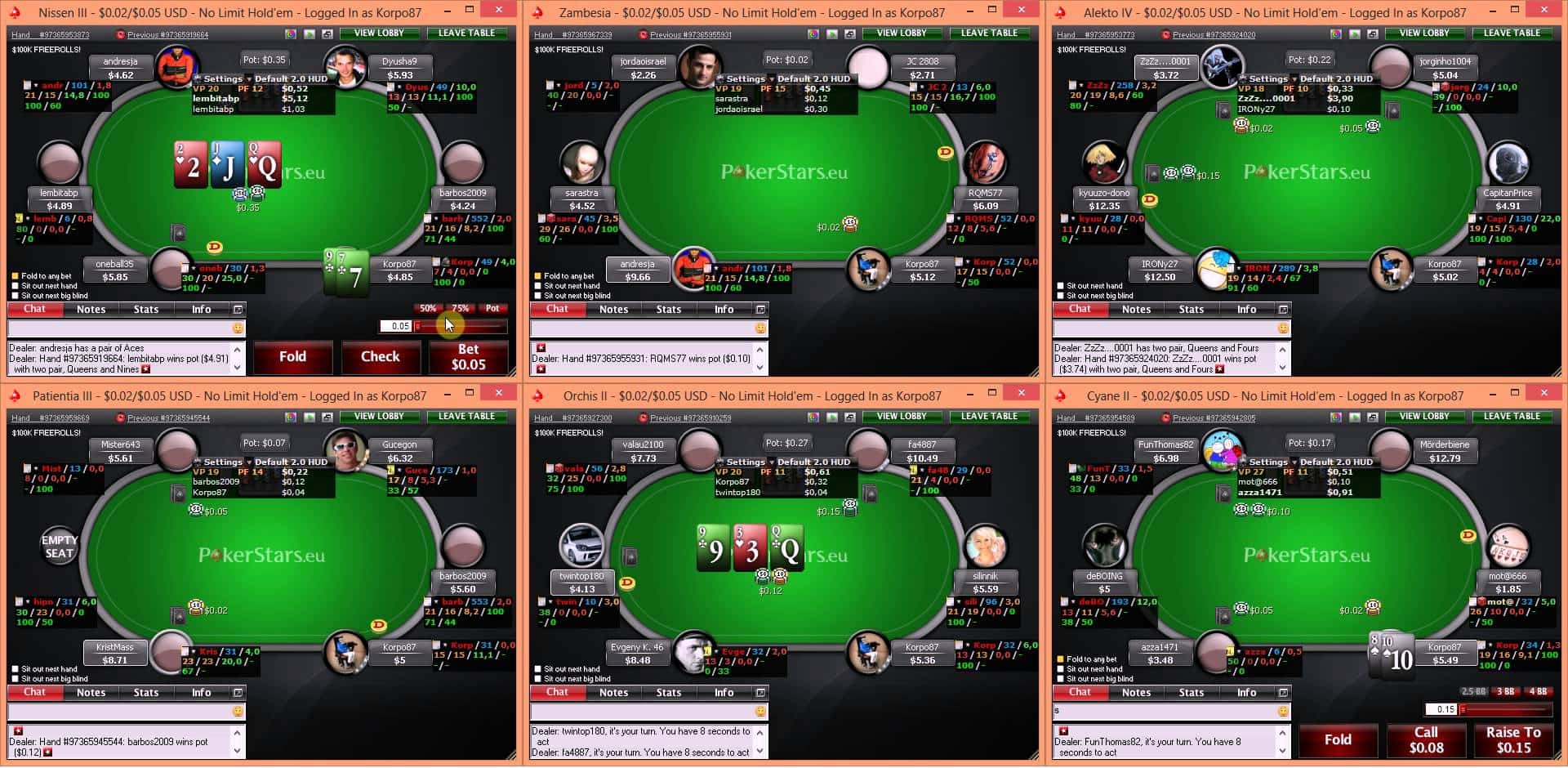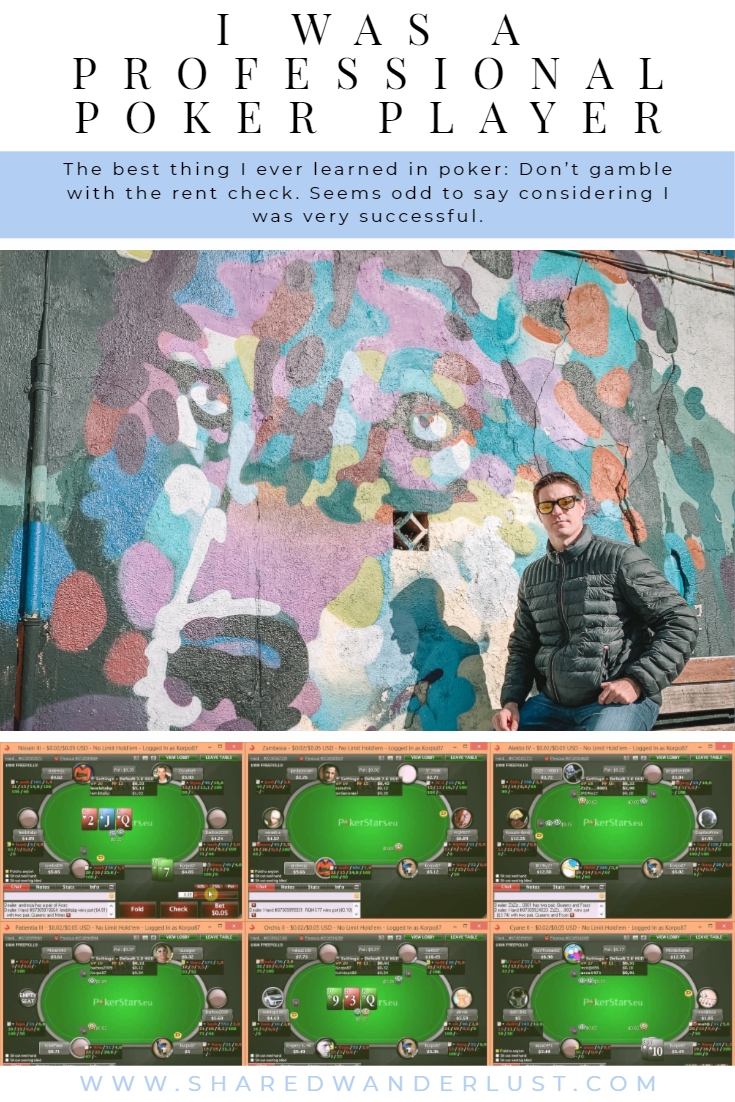I was a professional poker player for 2.5 years. My database had 3,000,000 hands of poker. I was Supernova on Pokerstars which is defined as the top 1% of the top 1%. My winnings are immortalized in that they bought my wife’s wedding ring and our destination wedding in Aruba. Here are my thoughts on poker as a profession.

These thoughts are going to be scattered, so feel free to jump around. If you feel I left something out, ask in the comments.
What does a professional poker player do?
Here’s what I looked at while playing every day:

Here are some thing you might not know:
- My database was running in the background collecting data on everyone playing. This isn’t a cheat, it’s open to everyone. If you play online, it’s against people who will have this software. You’ve been warned.
- The numbers beside the players represent different ratings for common things someone might do, like bet, raise, or fold. These ratings can quickly show how someone acts in very complicated situations.
- Macros or scripts were used to determine bet sizing. If I right-clicked, the bet amount would be 2/3 pot (the money in the middle). If I clicked the mouse wheel, full pot. Rolling the wheel moved the bet up and down. It was important to do this because there were often several decisions to be made per second.
6 tables typically got through 400 hands per hour. That means at least I had several decisions per second, for hundreds of dollars per decision. It’s stimulating for sure.
Stakes
I played 2/4 ($400 buy-in) No Limit Hold-Em on Pokerstars. 6-tables at a time meant I had $2,400-$5,000 at risk at any given moment.
My bankroll for this was $8,000 which was built up over a few months prior to starting professionally. That career change wasn’t exactly planned. I was a verified winner for years prior to this, so don’t think I went from nothing to pro in a few months.
Truths about online poker
- There are X professionals at the table, where X is the table limit minus 1. So at a 10 handed table, assume 9 professionals… and you. Guess your odds of winning.
- The banking systems behind these companies are at risk of being shut down at any time because they are glorified mob transactions (see: Full Tilt)
- There are bots online capable of winning in heads-up play and some tournament structures
- ~70% of online poker players lose
- ~23% of online poker players break-even after bonuses/loyalty programs
- ~7% of online poker players actually win money
- Less than 1% of online poker players can make a living at it
Statistics gleaned from my 3,000,000 hand database and talks with other professionals and their huge databases.
Pros of being a professional poker player
- Challenging and Rewarding
- Get to shit-talk the losers AND take their money AND listen to them cry
- No boss
- Every month you’ll feel like you’re the best poker player ever
Cons of being a professional poker player
- Everyone will treat you like a drug addicted child molester
- Legality is debatable
- No one actually believes you win money at poker, even when shown evidence
- Can’t verify employment / credit history for apartments or loans
- Everyone waits for you to go broke
- High Stress
- Rule/Rake changes can make beatable games unbeatable
- Everyone will try and tell you about that one hand they lost 10 years ago that’s completely boring
- Every month you’ll feel like you’re the worst poker player ever
A professional poker player’s day schedule
- Wake up at 11 AM because I was up until 2AM
- Log onto twoplustwo.com and read thoughts by other pros
- Eat lunch
- Work out early afternoon
- Warm up session of poker around 4pm
- Eat dinner
- Play video games or read the internet
- 8PM – ?? AM play poker
A poker player is on a weird schedule because your work time is everyone else’s leisure time. Playing in the day time is usually only against other professionals. That’s not exactly a good way to make money.
How much poker I played per day
Depends on how the day was going. Some days not at all. Some days 3,000 hands. I 6-tabled and averaged roughly 400 hands per hour. Live poker averages 30 hands per hour.
Playing over 6 hours a day is almost impossible due to the lack of mental energy. 6 tables simultaneously means 1-2 decisions per second for several hundred dollars each. My winrate would severely decline after 4 hours of play that day, so I’d pass the time with World of Warcraft.
“What’s the best you’ve ever done?”
My best month was making $18,000. Typical months were between $4,000 and $8,000. At the beginning of my career it was closer to the former, and at the end closer to the latter.
My hourly rate looked awesome though: $100+/hour! Sadly, it was difficult to play more than 50-60 hours in a month due to mental fatigue and motivation. Sometimes when you get kicked in the nuts for a few grand you just have to take a few days off or you’ll waste your entire bankroll in rage.
“What is the worst losing streak I’ve ever had?”
I think I broke even for 40,000 hands but still came out ahead after bonuses. I had one month where I lost: that was my last month.
My worst dollar loss was $30,000 at 5/10 ($1,000 buy-in) over a month. Interestingly enough I actually made money because of this! Playing with better opposition propelled me to beat my regular games at a much higher rate.
No one wants to hear your bad beat stories. Especially not poker professionals.
I’ve played 3,000,000 hands of poker in my career. That means I got dealt pocket aces/kings ~28,000 times. Even with aces/kings in the hole, you’ll lose roughly a third of the time. So I’ve lost with aces or kings 9,000 times. That’s more hands of poker than most people will play in their entire lifetime.
Your average poker night with the guys will go through 100 hands. Let’s say you have a poker night every week and get aces or kings every single hand. You’d have to lose every hand of aces or kings for two straight years to reach my level.
Losing with a great hand to a perfect hand became routine: quads over quads, straight flush vs royal flush. You could even see it coming in some cases. I’ve lost in ways you didn’t even know were possible, like the US government seizing Full Tilt bank accounts including one where I had a $3,000 dollar check coming my way. But I’m not complaining: I’ve taken far more out of the game than the game took from me. Losing big sometimes was just part of the deal.
No one believes you win money
My barbershop was a real man’s man place with Playboy and Penthouse magazines on the rack. I can’t imagine these guys had ever cut a woman’s hair before. They were just a block away from my place so I went there often.
They were also problem gamblers. Blackjack at Mystic Lake Casino, mostly.
I went to them for two years, and each conversation we had they tried to figure out how I made a living. They’d ask I got money through tax deductions since they could deduct their substantial tax losses each year. I told them I didn’t even know that was possible to have a casino print out your total losses each year for tax purposes. They’d ask if I worked with a string of other professionals to work against the fish. Nope.
They simply could not comprehend how I made money. I thought they were alone in their thinking, and I was wrong. Everyone assumed some form of illegal activity (selling drugs) or just leeching off my parents or the government. There was literally one person on the planet who believed that I actually made money at playing the game of poker, so I married her. It meant a lot to me that she saw poker as a skill activity instead of a mental health issue.
“Do you still play poker today?”
No. As a hobby it would be too frustrating because I wouldn’t be as good as I was and as a money-making activity it pales in comparison to anything I can do with online marketing. That’s why I got out: the games were getting harder and there’s too much opportunity in business.
“Should I become a professional poker player?” No.
First, you’re not good enough. Before I went pro I had been playing for 5+ years, read a dozen books, and posted on forums for advice. As I mentioned before, I was listed as the top 1% of the top 1%. If you’ve never been in the top 1% of some measurable competition (grades, sports, income, hobby), you don’t have the skill. I’m not trying to be a bastard here. I’m trying to save you money and heartache.
Second, if you ARE good enough then there’s far better ways to make money. The top guys in the business make their money from licensing deals and investments, NOT poker. Poker players are very aware that they don’t make money when they don’t play, so at some point it becomes a job with an hourly rate. No one working for an hourly rate ever gets rich.
But realistically, no you’re not good enough. A 6-handed table will have 5 professionals playing on it and one fish. When the fish leaves, the table breaks up. So not only do you have to be good enough to beat normal people (you aren’t), you have to be good enough to not get your ass handed to you by other professionals. The skill level required is off the charts.
“Is online poker rigged?”
No it’s not rigged. There were some online card rooms that reported shady dealings, and people quickly fled.
Are there some card rooms with rake so high that a player can’t be profitable? Yes, but that’s a different question and it’s in no way underhanded.
“What was your worst experience?”
Playing live poker at Canterbury Park, MN. It was early on a Friday night so the table was mostly sharks waiting for the fish to arrive.
A guy sat down at the table, still in work uniform and with the permanently oil-stained hands that signified he was likely a mechanic. He didn’t really know the game and had to be helped by the dealer. Some people tried to spark up conversation with him and it became apparent he wasn’t “all there”. He lost $400 in 20 minutes.
I got up and left. I preferred not to know I was taking money from the mentally handicapped and played almost exclusively online after that.
“What was your best experience?”
Buying my wife’s engagement ring, her BMW x5, our destination wedding, and giving $1,000 to each bridesmaid/groomsman to come to Aruba.
Most people go into debt or have their family pay for their wedding, and it was nice that a “gambling degenerate lowlife” like myself could afford these things. It made me feel legitimate.
“Do people collude online?”
I’m sure some people do collude online. Overwhelmingly they do not. If you’re good, it will make no difference to you because of the concept of “implicit collusion“. From each player’s point of view, it looks like the entire table is against him/her because there can be only one winner.
There have been times where I suspected collusion, but that’s easy to combat: tighten your range (don’t play mediocre hands) and shove (go all-in) more hands. Since at least one of the other players is in the hand by decision and not by card strength, they will be forced to leave the hand. And if they don’t then you have a good enough hand to win.
Fact: two bad players colluding online still won’t win.
The card rooms also check for this behavior and ban players attempting it. For example, two people at the table playing from the same IP address would be banned. They also look for accounts that regularly play together.
“What is your starting range of hands?”
This is the least important question that gets asked over and over again. Against raise happy professionals I’m very tight. Against non-professionals I get asked if I’ve ever folded in my life.
I don’t believe in the stock market
Poker professionals always fantasized getting out of the game, especially in the rough stretches. Many went to Wall Street or became day traders. Wall Street liked poker players because they were in the same business: gambling. All our words like “bankroll” and “variance” and “rake” were just other words that Wall Street used with stocks.
Take it from a professional gambler: the stock market is 100% gambling.
“Will you play in my home game?”
I’ve done this before and it never ends well. I place in the money or win outright, all the while listening to people complain about how lucky I am. And people get really angry about losing their $20. Meanwhile, the money I win is meaningless to me and the challenge is non-existent since I’m used to playing 6 tables with 4 other professionals at each table. Playing a single table against terrible poker players is excruciatingly boring.
“Any regrets?”
Not really. It would have been interesting to see what would have happened if I really tried to become great at the game instead of just grinding out money, but I was just a different person at the time.
My plan during my career was just to make it another month and stay out of the hell that is the modern office job. That’s actually still my goal. I’ll consider my life a success if I never have to go back to being a wage slave.
The best thing I ever learned in poker
Don’t gamble with the rent check
Seems weird that this is what I’d learn, right? How could I not gamble with the rent check when that’s how I made money?
Professional gamblers have a “bankroll”: a total amount of money used for gambling that can withstand the up and down swings of the game. The whole point of the bankroll is to make sure you don’t lose all your money gambling. The lower my bankroll got, the higher my stress became. Which in turn lowered the quality of my play… you can see where this is going. Bad days became bad weeks which became bad months spiraling out of control.
Today I keep a lot of cash on hand so I don’t have to worry about “OOPS” payments. I’m willingly losing money by not investing, just for this “feel good” mood. By knowing that my immediate future is secure, I can branch out into other things like growing our business or starting new ones.
Some of the early months in poker I was living hand-to-mouth, putting off buying necessary items until my check came. My stress levels were off the charts as could be seen in my face: stress brings out my Roseaca (adult acne).
If I could suggest one thing to people: get rid of debt and save up an emergency fund. The mental benefits are fantastic. It’s like being high all the time.
Despite the stress and being thought of as an addicted mental patient, I’d do it all over again
Because it’s too much fun to take some loudmouth’s money away from him.
Pin it for later!



Do you think that your playing ofwarcraft 2 as Wilbur wright helped you become a better player?
Author
I think it was crucial to my development as a human being and improved the world, Orville.